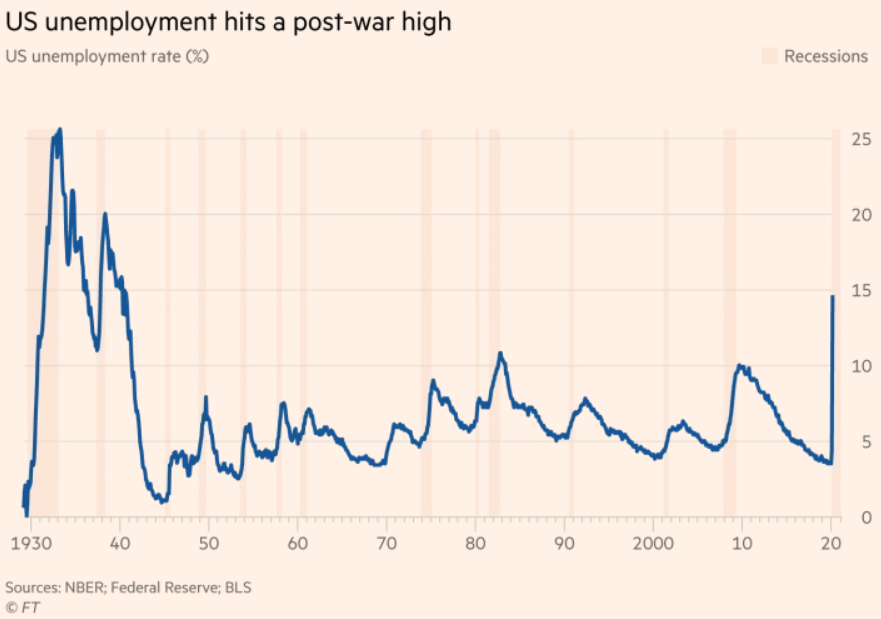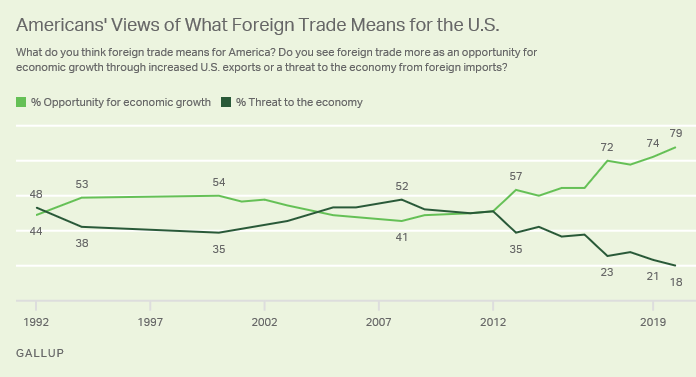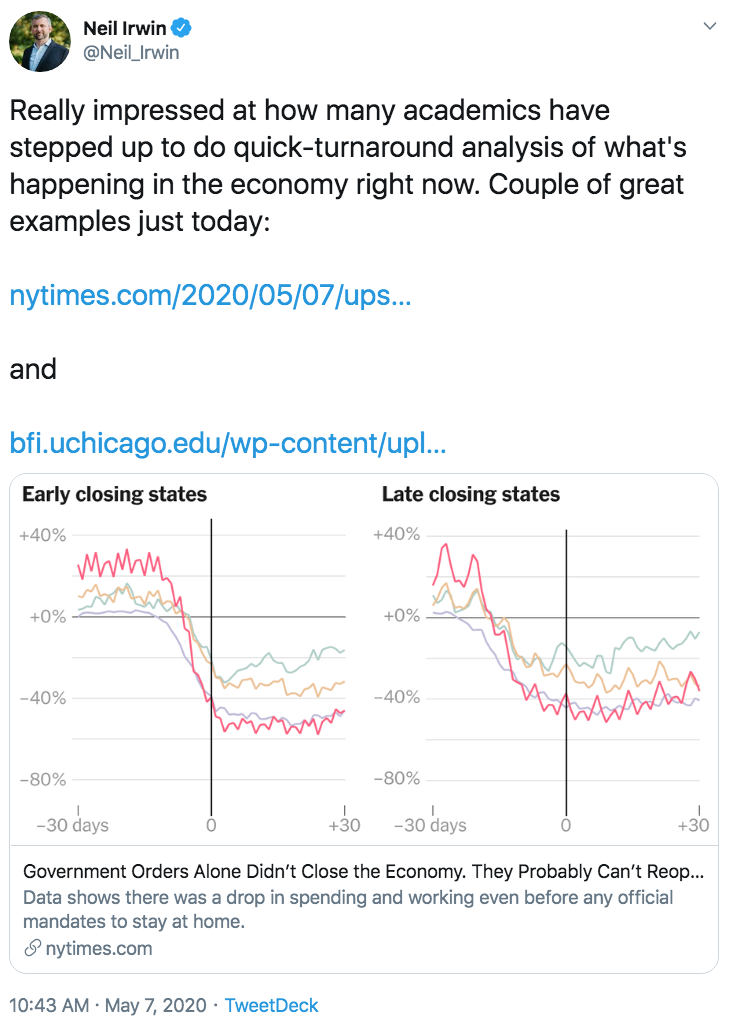Hoover’s curse continues . . .
Ever since Herbert Hoover was elected in 1928, the GOP has been cursed by bad luck. If you elect a Republican President, bad stuff is likely to happen:
1. The 1929 stock crash and subsequent banking crisis. (25% unemployment)
2. Three Eisenhower recessions (vs. zero for Kennedy/Johnson)
2. The 1973 OPEC oil embargo (9% unemployment)
3. The 1981-82 Volcker disinflation (10.8% unemployment)
4. 9/11
5. The 2008 banking crisis (10.0% unemployment)
6. The Covid-19 depression (14.7% unemployment, headed for 20%)
Napoleon supposedly wanted lucky generals. Shouldn’t America desire lucky presidents?

Off topic. David Beckworth directed me to this Gallup poll:

As you know, I don’t view polls as a reliable indicator of public opinion. But I think it’s fair to say that there is basically no evidence for the claim that the public is turning against free trade, or at least no evidence that anyone has presented to me.
The public has rejected neoliberalism? Prove it.
David also directed me to this interesting tweet:

As I’ve said many times, the current depression is caused by voluntary social distancing, not government mandates. Lifting the lockdown won’t stop the depression. Our unwillingness to aggressively pursue testing, vaccine development, etc., is a disgrace.
Tags:


8. May 2020 at 10:26
It sure is weird that 9 of the last 10 recessions started under Republican Presidents, despite them only holding office half of the time. It’s almost like Republican political theory emphasizes extremely short-term thinking, ultimately harming the long-term well-being of the nation.
8. May 2020 at 11:09
Bob, But that would actually predict the opposite. The GOP has been recklessly irresponsible in juicing the economy under Nixon and Trump, and still they’ve presided over more recessions. The gang that couldn’t shoot straight.
8. May 2020 at 11:38
There is approx. 99% chance of surviving corona . Of course some groups are more at risk than others. Our society is used to comfort and security. Thus When they experience inordinate fear, prudence is abandoned and bad things usually follow.
8. May 2020 at 11:40
@ssumner: While it was disgraceful how little the US did early on when China was having the worst of it, what makes you think we are not currently pursuing testing and vaccine development?
8. May 2020 at 12:44
I know it’s probably a coincidence and Presidents don’t have much influence over the economy. On the other hand, Republicans have generally pursued more reckless fiscal policy and seemingly appointed more unqualified officials to the Fed, causing additional inertia in monetary policy.
8. May 2020 at 13:49
So do you think this is coincidence or not? The picture might be more balanced when you consider who was in control of Congress as well. This may even make some sense because it is Congress who passes fiscal policy.
https://en.wikipedia.org/wiki/File:Party_divisions_and_control_of_the_house_and_senate.pdf
Other approaches would be graphs in the form of presidents vs. unemployment rates, these graphs actually exist. And congressional control vs. unemployment rates as comparison, these graphs also exist, but often only from the 1980s to the 2000s.
8. May 2020 at 14:11
msgkings, We are, but nowhere near as aggressively as we should.
8. May 2020 at 16:15
A secretive approval process for air transmissible virus research might be a form of Republican deregulation.
Epidemiologist Marc Lipsitch wrote in 2019 in the Washington Post that…
How much secretive funding went to bat virus researchers in China since the ending of the moratorium and which concerned parties were able to provide advice and warnings and what did they say?
8. May 2020 at 16:35
Scott wrote: “2. The 1973 OPEC oil embargo (9% unemployment)”
Unemployment rate:
1973 4.9%
1974 5.5%
1975 8.4% peak at 9.0%, 20 months after the ‘oil embargo’ started.
1976 7.7%
1977 7.1%
1978 6.1%
1979 5.9%
1980 7.2%
1981 7.6%
8. May 2020 at 18:13
Hi Scott,
I would just like to point your attention to Fed Funds Futures. As of May 8 at about 7:15 PM on the west coast they are negative through Feb 2022.
8. May 2020 at 19:26
Todd, Yes, I didn’t mean to suggest the unemployment rate hit 9% immediately, it responded with a lag. And of course it wasn’t just the oil shock; other factors were also at play, such as the removal of price controls.
rwperu34, Yes, that seems like bad news to me.
8. May 2020 at 19:52
I’d think price controls were 90% of the cause in the increase in unemployment.
9. May 2020 at 04:07
“Transition to greatness.” That’s Trump’s new theme for the economy. By “transition” he’s referring to the third quarter, while Trump’s not precise about when greatness will arrive. Sometimes he implies the fourth quarter (a “good fourth quarter”), but then focuses on next year as being “great”. I would be happy with “good” but Trump has higher standards. I suspect the “transition to greatness” will extend past election day, with the excitement building for the arrival of greatness once Trump is re-elected. During the “transition” Trump is counting on the Fed to prevent financial asset prices from collapsing, something the Fed has so far succeeded in doing. The longer the “transition” the harder the task. If the only “transition” experienced in the third quarter is a spike in covid 19 cases and deaths, then “greatness” any time soon will be in doubt. That’s when investors may come to doubt the magic power of the Fed to prop up financial asset prices. At that point, Trump will be tempted to fire the entire cast of characters at the Fed, blaming the losers for the prolonged “transition to greatness” and collapsing financial asset prices, and appointing as replacements anybody willing to accept the job and the blame. “Greatness” will have to wait.
9. May 2020 at 07:21
Free trade = neoliberalism?
9. May 2020 at 08:51
Todd, It’s more the removal of wage controls. Nixon had wage controls in 1971 and 1972 while he juiced the economy to get re-elected. After the controls were removed in 1974, wages shot up while tight money was brought in to reduce inflation. A deadly combination for the labor market.
Rayward, He’ll define 20% unemployment as “greatness.”
Ewan, It’s certainly a big part of it, and it’s the part that anti-neoliberals had blamed for the decline of the working class.
9. May 2020 at 09:35
A glimmer of hope: Democrats are pushing for big testing expansion in the next stimulus package and many senate republicans agree. I hope they aim big enough.
https://www.cnn.com/2020/05/07/politics/republican-reaction-trump-covid-testing/index.html
9. May 2020 at 19:50
When the US elects Democrat Presidents, it gets into big wars:
Woodrow Wilson – WWI
FDR – WWII
Truman – Korean War
LBJ – Vietnam War
Shouldn’t the US want peaceful presidents? Maybe the US needs a Party that produces Presidents for whom history doesn’t happen.
10. May 2020 at 03:09
Free trade is something all orthodox economists advocate. Not all are neoliberals. Neoliberalism has a large political element.
Also, not all orthodox economists are for free trade a l’outrance. “Global Trade and Conflicting National Interests” by Ralpoh E. Gomory and William J. Baumol makes a more nuanced argument. (As far as I can tell, and I am well aware that I can’t really tell – what do you, as a qualified economist, think?)
10. May 2020 at 11:22
@Lorenzo: the Bushes tried to catch up as far as making wars. That second one was stupid as hell. As far as WWI, II, and Korea, I wouldn’t say it was the US driving it (unlike the Republican wars recently). Vietnam yes that one is on us. But it was pretty bipartisan. The left was the antiwar faction for that one.
10. May 2020 at 17:36
cheap shot and i hope Margaret scolds you. Hoover was a humanist technocrat who did much to relieve suffering in post ww1 europe. france’s gold hoarding, the boe going off the gold standard, the war reparations and the dumb dawes plan conspired to create the crash of 29 and beyond, abetted by an incompetent fed refusing to see the pyramids being erected on wall street.
10. May 2020 at 21:22
Msgkings, the US was definitely driving their own involvement in the world wars. (Whether that involvement was a good or bad thing is a different question.)
10. May 2020 at 21:25
Scott, of course, just because Republican presidents seem to be in power recently when recessions hit doesn’t tell us anything about causation, though.
Perhaps more stressful global economic times make people vote republican, but also make recessions more likely? Or it’s all a coincidence?
How would you investigate causality?
Of course, as far as investing goes, you wouldn’t need to know the causality. You’d just treat the party of the president as an indicator to buy or sell and don’t worry how it works.